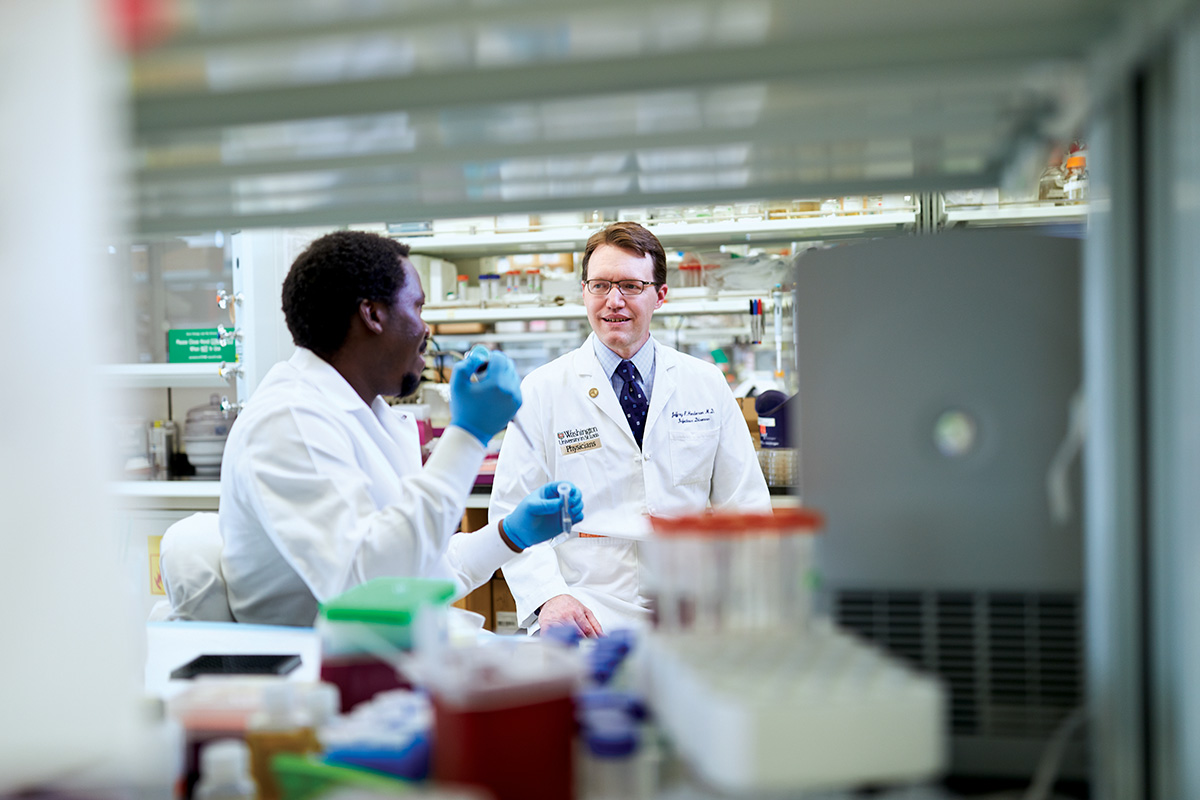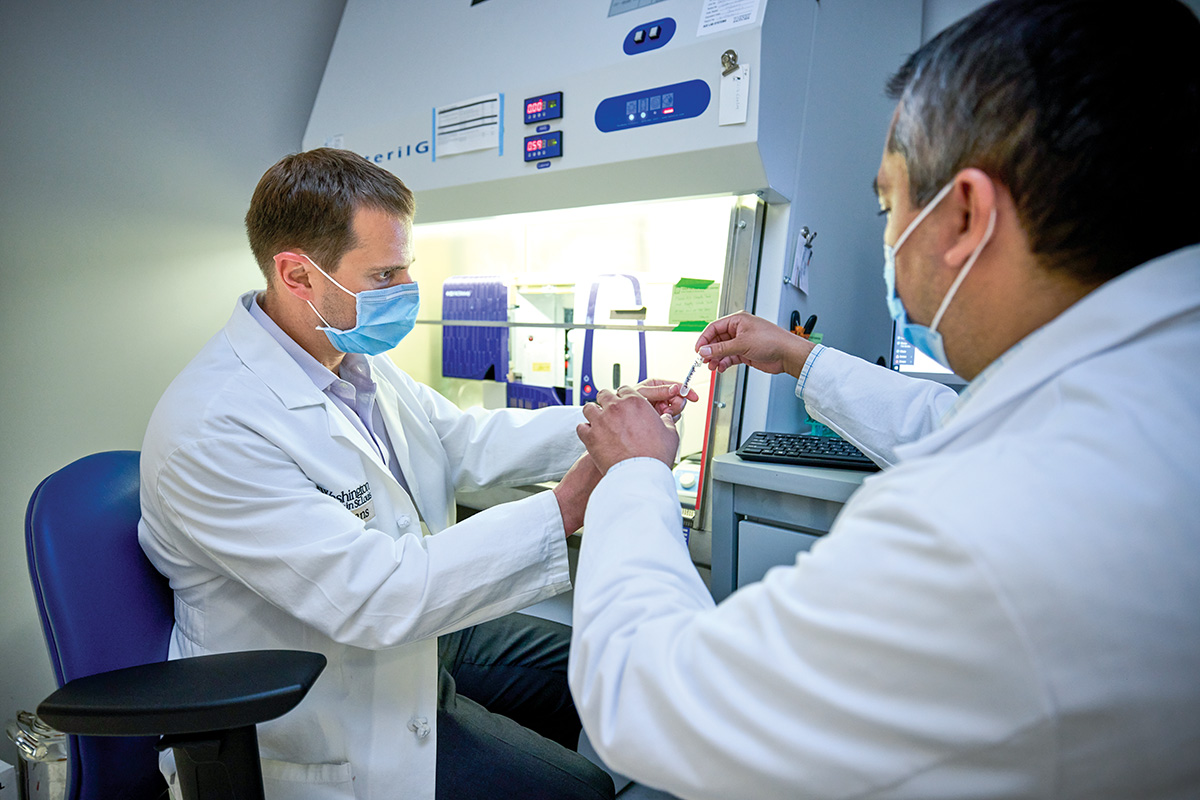
As a young School of Medicine faculty member rounding on patients, Jeffrey P. Henderson, MD/PhD, observed an increase in recurrent urinary tract infections (UTIs) among hospitalized older adults, who experience a high rate of UTI complications. If there was a way to identify the biomarkers of a severe infection, he theorized, at-risk patients could be treated earlier and more effectively, leading to better outcomes.
Seeking to gather preliminary data, he applied for and received a seed grant from the Longer Life Foundation (LLF), a unique collaboration between Washington University School of Medicine and St. Louis-based Reinsurance Group of America Incorporated (RGA). “It was a valuable opportunity for someone like me, who was just starting out and needed to get a foot on the first step,” said Henderson, now an associate professor of medicine and of molecular microbiology, who specializes in infection pathogenesis with a special focus on UTIs.
His study, completed in 2014, revealed that differences in urinary pH and metabolite composition determine whether an important immune protein is able to inhibit bacterial growth. That work led to additional studies suggesting new therapeutic and diagnostic strategies for recurrent UTIs and other bacterial infections.
“The grant helped me to ask the right questions, gather resources and develop methods,” Henderson said. “That support during our team’s early investigations allowed us to show other funders we had an idea worth exploring.”

This year, the foundation is celebrating 25 years of funding groundbreaking research into the drivers of mortality and morbidity. Since its founding in 1998, the foundation has supported 146 projects, awarding $8.3 million to study genomics, obesity, older-age cognition, heart disease, cancer and more.
A novel pairing
“The Longer Life Foundation is a wonderful philanthropic effort by RGA to support young scientists and more established researchers as they move their investigations into new areas,” said Dominic N. Reeds, MD, professor of medicine and director of the Longer Life Center, the foundation’s administrative arm on the Medical Campus. “Science is not free. These researchers receive support at a critical point when it’s the difference between being able to conduct the research or not.”
The foundation was the brainchild of A. Greig Woodring, former president and chief executive officer for RGA, and the late William A. Peck, MD, former executive vice chancellor for medical affairs and dean of the School of Medicine. They believed a partnership focused on longevity-related research would benefit public health, clinical medicine and the insurance industry. The researchers would receive funding for studies with the potential to advance human health. And insights from this research could help the life and health insurance industry more accurately assess applicants and provide cost-effective coverage.
“Pairing an academic institution with the insurance industry was a novel idea that hadn’t happened before,” said Daniel D. Zimmerman, MD, managing director of the Longer Life Foundation and senior vice president and chief science adviser for RGA. “The relationship between Washington University and the Longer Life Foundation is truly remarkable because the world-class research taking place is improving health and wellness for many people. The ability to live a healthy and fulfilling life is important for everyone.”
Each year, six to eight researchers receive one-year grants of up to $50,000 from the Longer Life Foundation. They can apply for a second year of funding based on their findings. Recent awardees represent departments across the university.
Many of the pilot and feasibility studies funded by the foundation have provided proof of concept that has enabled researchers to secure additional grants to continue their work, some more than 10 times the amount of the foundation’s initial investment. More than 170 articles citing foundation support have been published in peer-reviewed scientific journals.

Zimmerman acknowledged that not all projects are successful. “We know that some experiments might fail or prove the null hypothesis or that they might be the first step in a multitude of steps to get to a certain point,” he said. “We give investigators the ability to fail or succeed in small increments. That’s how science works, and we want to support investigators on the journey of discovery.”
In addition to funding, researchers receive mentorship and support. “We advise investigators at all stages of their projects to keep them engaged and ensure their success,” said Bradley A. Evanoff, MD, MPH, chair of the Longer Life Foundation scientific review committee and the Richard A. and Elizabeth Henby Sutter Professor of Occupational, Industrial and Environmental Medicine at the university.
Mentorship starts with the application process. The foundation hosts orientation sessions, where researchers can gather feedback on their plans before submitting a formal proposal. Those whose projects are not funded have the opportunity to receive additional feedback and are encouraged to reapply.

Increasing collective success
Evanoff meets regularly with grant recipients to identify challenges and provide needed resources. That includes connecting researchers who have similar interests and experiences. “WashU faculty members are eager and willing to share information and techniques to help others succeed,” said Evanoff, who also serves as assistant vice provost for Washington University and as director of the Division of General Medical Sciences in the Department of Medicine. “Our faculty recognize that the achievements of our colleagues often create new opportunities and increase our collective success.”
In its role as the interface between the foundation and Washington University, the Longer Life Center organizes and hosts research seminars, grand rounds, guest speakers and other activities for the research community. The center also secures clinical specialists to provide updates and continuing education for insurance groups.
In the future, Zimmerman said the foundation hopes to grow its support of researchers across the university, including public health experts who could address an array of health challenges. The foundation is also interested in projects focusing on the social determinants of health, which have an important influence on health inequities.
“We’re proud of the work done through the Longer Life Foundation over the past 25 years and pleased that the foundation has grown and thrived during that time,” Zimmerman said. “We look forward to continuing our support of and collaboration with Washington University for many years.”
Published in the Spring 2023 issue








 Share
Share Tweet
Tweet Email
Email